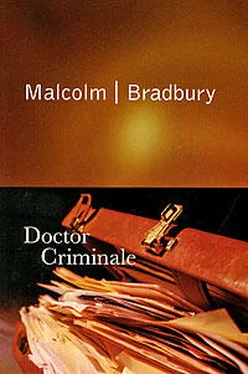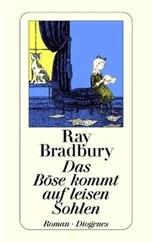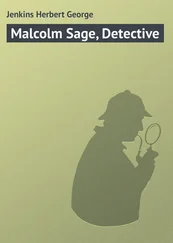Malcolm Bradbury - Doctor Criminale
Здесь есть возможность читать онлайн «Malcolm Bradbury - Doctor Criminale» весь текст электронной книги совершенно бесплатно (целиком полную версию без сокращений). В некоторых случаях можно слушать аудио, скачать через торрент в формате fb2 и присутствует краткое содержание. Город: London, Год выпуска: 2000, ISBN: 2000, Издательство: Picador, Жанр: Современная проза, на английском языке. Описание произведения, (предисловие) а так же отзывы посетителей доступны на портале библиотеки ЛибКат.
- Название:Doctor Criminale
- Автор:
- Издательство:Picador
- Жанр:
- Год:2000
- Город:London
- ISBN:978-0330390347
- Рейтинг книги:5 / 5. Голосов: 1
-
Избранное:Добавить в избранное
- Отзывы:
-
Ваша оценка:
- 100
- 1
- 2
- 3
- 4
- 5
Doctor Criminale: краткое содержание, описание и аннотация
Предлагаем к чтению аннотацию, описание, краткое содержание или предисловие (зависит от того, что написал сам автор книги «Doctor Criminale»). Если вы не нашли необходимую информацию о книге — напишите в комментариях, мы постараемся отыскать её.
Doctor Criminale — читать онлайн бесплатно полную книгу (весь текст) целиком
Ниже представлен текст книги, разбитый по страницам. Система сохранения места последней прочитанной страницы, позволяет с удобством читать онлайн бесплатно книгу «Doctor Criminale», без необходимости каждый раз заново искать на чём Вы остановились. Поставьте закладку, и сможете в любой момент перейти на страницу, на которой закончили чтение.
Интервал:
Закладка:
‘That bitch, that bloody bitch,’ said Ros, ‘I just spent two nights in her bed and now she does this to me. Upstairs, Francis. If I’m not coming on this recce with you, I want you to have something to remember me by.’ ‘Honestly, Ros, I’ve got lots to remember you by,’ I said, ‘And if I’m going away for a few days I ought to go back to my flat and pack some things.’ ‘No you don’t,’ said Ros, ‘You can buy what you need at the airport in the morning. There are plenty of shops in the concourse.’ ‘I always wondered what they were for,’ I said, ‘After all, not many people arrive naked at an airport.’ ‘You’re learning a lot, aren’t you, Francis?’ asked Ros, ‘Come on, if this is our last night together for a bit we don’t want to waste time. Is there any more of the Frascati left?’ ‘No, there isn’t, Ros,’ I said very wearily, ‘There’s only orange-juice.’ ‘All right,’ said Ros, ‘Let’s try that.’
So that night before I set off for Vienna turned into a sleepless one, and for several reasons. Ros felt it necessary to give me a great deal to remember her by, but even when she slipped off into sleep’s kind oblivion at last I still lay there restless. Sounds of Bengali floated up occasionally from the street at me; now and then Ros groaned in her sleep. Why, just why, was I going off in quest of Bazlo Criminale? For, in the course of a hyper-active evening, something strange had plainly happened. Criminale had changed for me: no longer a text I had to decode, he had switched into a person I had to follow. But why, when nothing at all linked us together? He was the giant, one of the great superpowers of modern thought; I was the Patagonian pygmy. He was the Lukacs of the Nineties; I was an out-of-work journo. He was the modern master; I was the postmodern nobody in particular. He was the friend of the great and the good, or for that matter the big and the bad: Bush and Honecker, Gorbachev and Castro, Kohl and Mao. Important philosophers like Sartre and Foucault and Rorty had bowed to him; great leaders had honoured him; it was even said that Stalin (notoriously no respecter of persons or keeper of unwanted mementoes) had asked for his photograph. He was complex, confusing, contradictory. But why should I set off to chase an enigma that could well be of my own making?
At that time, not so long ago, I was innocent (I suppose I still am to this day, this very day). But I was not so innocent that I couldn’t see that anyone who had survived and bested the second segment of our sad terrible century must have had some remarkable struggles with history and terror, contradiction and ambiguity. Silence, exile and cunning were James Joyce’s prescription for the task of the modern writer and thinker in an age of brutality and unreason, bombardment and slaughter, ideology and holocaust, a century of intellectual terrorism, an age, as Canetti once said, of burning flesh, when police thuggery had turned on thought itself. Thanks to silence, exile and cunning, some artists and intellectuals had had strange flirtations with the mad ideological world. Pound had played with Fascism, Heideggerwith Nazism, Brecht with Stalinism, Sartre with Marxism, and so on and on. Right to our time the terrible game went on, and still would, whenever intelligence faces power, totalitarianism and fundamentalism of any kind.
As for me, I lived on a small island on the edge, spared much of this history, and tucked away at what looked like the safe end of the century. No doubt, if I went looking, if I searched hard or critically enough, I would find something. Criminale had lived through dark passages and false directions; he must have had his weak spots, his feet of clay, his own deals on silence, exile and cunning. Anyone who had struggled through the brutalities and absurdities of the modern chaos, the gulag horrors and extremities, had probably come put a little marked or impure. The enigmas I believed I’d seen were perhaps no more than the devious ways needed for a man of public thought simply to survive. And who was I to go unmasking? Wasn’t there something just as impure about the investigative journalist who, trying to hold on to a career, make a living, make a programme, goes gaily out hunting secrets, hoping to find the worst? And did I really want to go down in the record as the man who’d misread, misused, misrepresented the great career of that hero of late modern thought, Bazlo Criminale?
So I had a bad night, followed by a bad morning. When dawn light came up, I got out of bed and kissed Ros lightly on the forehead, not wanting to stir the sleeping beast again. Luggageless in the street outside, I found a taxi that took me, as sore in body as I was in mind, out to Heathrow. I went gratefully round the franchise stores, buying socks at Sock Shop, ties at Tie Rack, knickers at Knickerbox, shirts at Shirt Factory, shampoos and stuff at the Body Shop. Finally I bought a lightweight carry-on suitcase at the last franchise, and sat on a bench by check-in, packing my new wardrobe carefully inside. ‘Did you pack the bag yourself?’ asked the girl at the desk, when I checked in for the Austrian Airlines flight. ‘Of course I did, you just watched me,’ I said; but of course she unpacked it anyway, unloading what I’d loaded, stripping the case to its linings before she would grant me a boarding pass.
I went through Security, where it was not my baggage but my very self they stripped down to the bare forked basics. The guards felt me up unmercifully, as if I had not just had enough of that sort of thing with Ros during the night. In the departure lounge, as I headed into duty-free to buy a razor, a girl in satin tricoloured panties came over and sprayed me with perfume. ‘A new male parfum from Chanel called Egoiste,’ she said, ‘We ’ope you like it.’ ‘Egoiste?’ I said, ‘If Chanel want to sell perfumes in airports, why don’t they make one called Terminal Depression?’ I went to the bar, where all the seats were taken by travellers watching screens for information about their delayed flights. Standing by the wall, with a gin and tonic melting rapidly in a plastic glass, I looked for news of the Vienna flight. Then the intercom announced it would be two hours late, because of lack of landing slots for the incoming flight, which they had decided to leave hanging up there in the sky for most of the morning.
I stank of perfume, my baggage was new, my body was sore, and the lounge filled to the point of maximum congestion. It was as I was standing there that it occurred to me, for the first time, that even the life of a great world-traveller like Bazlo Criminale, a man who hopped like a rabbit from government meeting to international congress, from hub airport to hub airport, from VIP lounge to stretch airport limo, from first-lass recliner to prison-like plane toilet, a man who made homelessness into a postmodern art form and had never stayed in one place for anything like a reasonable length of time, probably also had its downside. He must have had more than his share of delays, crowds, congestions, strip-searches, luggage losses, misdirections; he too must have his portion of Terminal Depression.
They called the Austrian Airlines flight to Vienna three hours late. I dragged my way down the long Heathrow passages, through the green-seated lounge, down the grim boarding tunnel, in through the plane door – and found myself suddenly in the world of Gemütlichkeit . ‘Gruss Gott, mein Herr,’ said a dirndled stewardess in red and white, as Papageno and Papagena chittered and chattered happily on the plane Tannoy. Passengers in great green loden coats stuffed green Harrods bags into the overhead lockers, or sat staring stolidly into the stern financial pages of the Austrian newspapers that were on offer at the plane door. Then we took off, and the trolleys came along. There was cream with the coffee, cream with everything. There was even cream on the face of the fat girl dressed like a sofa who came smiling down the aisle as we passed at high altitude over the white-capped, roadless Alps.
Читать дальшеИнтервал:
Закладка:
Похожие книги на «Doctor Criminale»
Представляем Вашему вниманию похожие книги на «Doctor Criminale» списком для выбора. Мы отобрали схожую по названию и смыслу литературу в надежде предоставить читателям больше вариантов отыскать новые, интересные, ещё непрочитанные произведения.
Обсуждение, отзывы о книге «Doctor Criminale» и просто собственные мнения читателей. Оставьте ваши комментарии, напишите, что Вы думаете о произведении, его смысле или главных героях. Укажите что конкретно понравилось, а что нет, и почему Вы так считаете.











